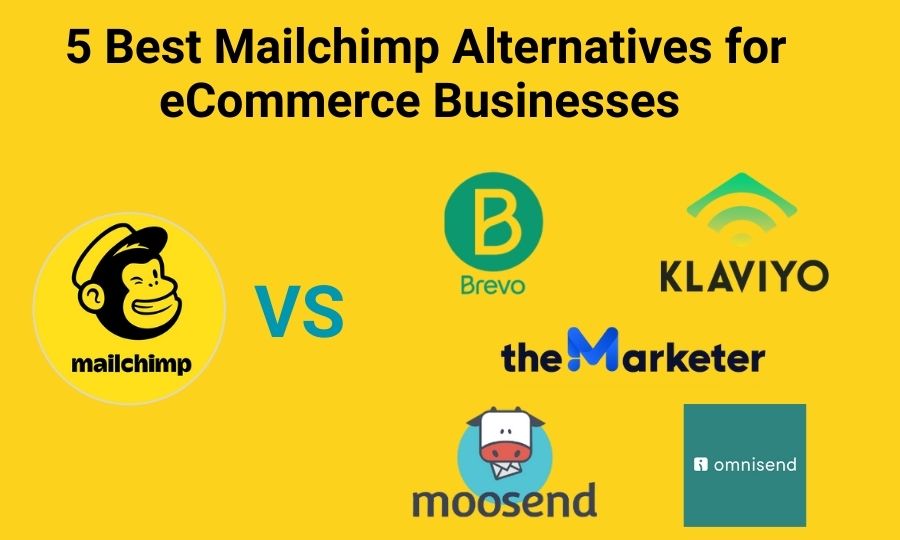When setting up an online store, you don’t need much to reach your email subscribers. A welcome campaign, an order confirmation email, a birthday message, and that’s pretty much it.
So, you start your email marketing journey with Mailchimp’s free plan to test the waters. The list of features is impressive. Plus, you get various integrations with third-party tools. The thing is that Mailchimp’s free version might only suit your eCommerce business for as long as your needs are simple.
But even if you upgrade, the platform restricts features like multi-step automation or form customization in lower-tier plans. And you can’t access its full suite of email templates or integrations. To unlock Mailchimp’s full functionality, you have to pay more.
If these pain points sound familiar, it’s time to explore top-notch Mailchimp alternatives that offer all the must-have eCommerce features at a reasonable price.
To help you out, we’ve researched six popular email marketing platforms, comparing user reviews and analyzing top features and pricing. But before going through our findings, let’s see what to look for in your new email software.
What to Look for in a Mailchimp Competitor
Picking the right email tool for your business is a big deal. That’s why you should first identify the non-negotiable features and tools to truly upgrade your email campaigns, not just replace Mailchimp. Let’s see what makes a difference for your eCommerce brand:
- Flexible and scalable pricing: Your email software should grow along with your business. Basically, it should scale logically without hurting your budget. The tools listed here charge you based on the number of contacts and/or email sends. And some of them don’t put limits on features in low-tier plans. Also, here you’ll find Mailchimp competitors with flexible pricing models like Pay-as-you-go plans.
- Top-notch segmentation and personalization: Look for a Mailchimp alternative that allows you to group recipients by mixing and matching several characteristics and behavioral data. Segmentation shouldn’t be static, so you need dynamic segments that update automatically. Plus, you’ll want to personalize your eCommerce emails using features like AI-driven product recommendations and conditional content.
- Sophisticated automation: A visual automation builder is a must-have, making it easy to build a custom sequence or edit pre-made workflows (yes, the platform should offer these too). You also need eCommerce-specific triggers like cart-abandonment, product purchases, and page views. “If/else” conditional logic lets you tailor the customer journey with precision based on each subscriber’s attributes and behavior.
- Excellent deliverability and support: What comes before features is getting your campaigns delivered to inboxes. The right alternative to Mailchimp should invest in proper infrastructure, so you have one less thing to worry about. For the same reason, you need useful resources such as FAQ articles, blog posts, and demos. Moreover, look for responsive customer support on more than one channel to have guidance at every step.
- Integrations with third-party apps: To target recipients effectively, your email software should offer integrations with your existing tech stack. Through them, you can sync a wealth of data across systems, ensuring real-time and unified insights. Besides eCommerce platforms like Shopify or WooCommerce and CRM tools, you’ll also want integration with survey platforms to have an additional data source.
5 Alternatives to Mailchimp for eCommerce Businesses: Top Features & Pricing
Knowing what you’ll need is the first step. Now let’s explore five email platforms that check the boxes for your eCommerce email marketing:
1. Moosend
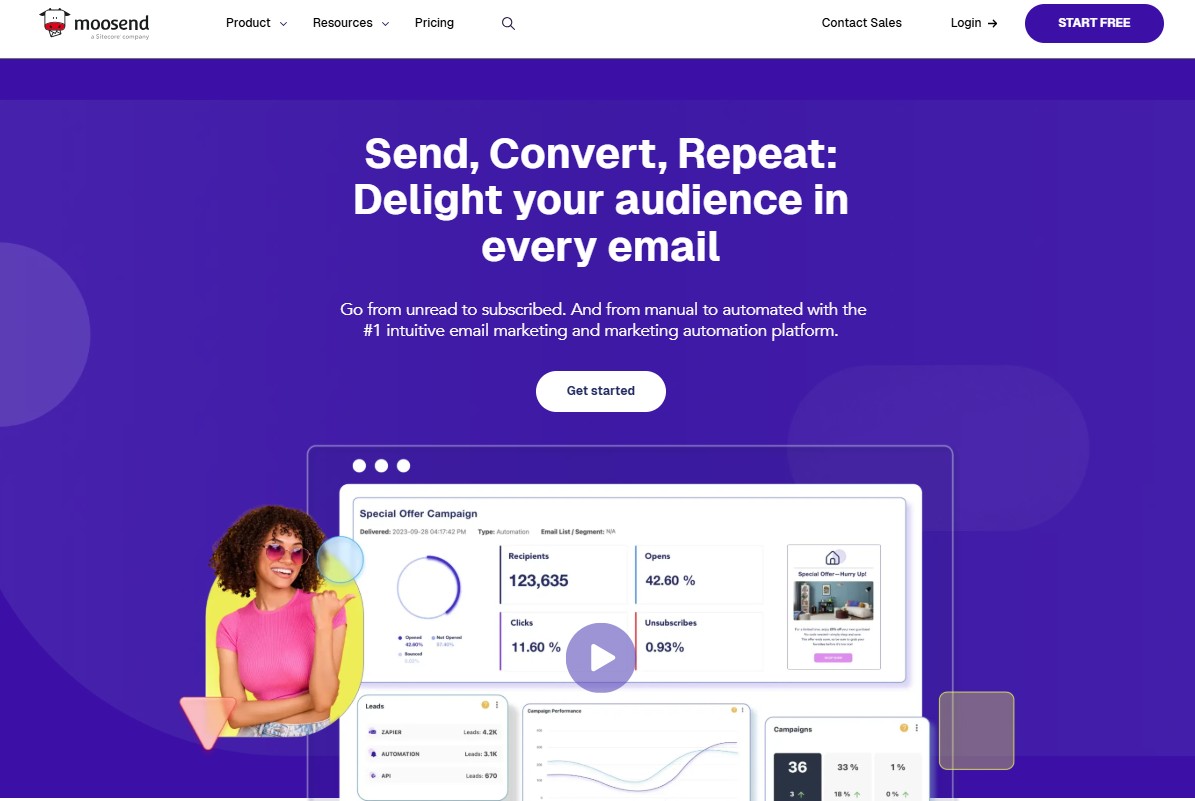
Mailchimp versus Moonsend
First on our list comes Moosend, a budget-friendly Mailchimp competitor with an intuitive interface and powerful eCommerce features.
No coding experience? No problem since with Moosend’s email builder you create responsive email campaigns in a few clicks. You also get more than 130 email templates to use as a starting point and an AI writing assistant that addresses writer’s block (especially if you aren’t or can’t afford one).
This combination of affordable pricing with time-saving tools makes Moosend a good fit for small business email marketing where you want to do more with less.
Where Moosend excels:
- Drag-and-drop email editor to move around ready-to-use content blocks like videos, GIFs, even countdown timers for flash sales and limited-time deals
- Visual automation builder to send triggered emails, create multi-step automation workflows, and use built-in recipes for eCommerce-focused use cases (all available in every pricing plan)
- Transactional emails to send timely updates after common customer actions like account activation or order placement
- Six subscription form types (plus ready-made templates) to master eCommerce lead generation depending on how you want to capture visitor attention
- AI-based product recommendations to engage each reader with targeted promotions and leverage cross-selling and upselling opportunities for repeat purchases
- Advanced email analytics, including real-time reporting, activity tracking by location and device, as well as the option to create your own custom reports
- Stellar email deliverability and fast customer support available 24/5 via email and live chat (on all plans, even the free trial)
Where Moosend could improve:
- No SMS marketing tool
Pricing:
Moosend doesn’t offer a free-forever plan. However, its generous 30-day free trial allows you to test all core features, plus send unlimited emails. Paid plans start at $9/month, including automation, lead generation, 80+ integrations, and more. The platform offers a Credit option, so you only pay for what you send. This pricing model is ideal for businesses with limited budget and/or seasonal needs.
2. Klaviyo
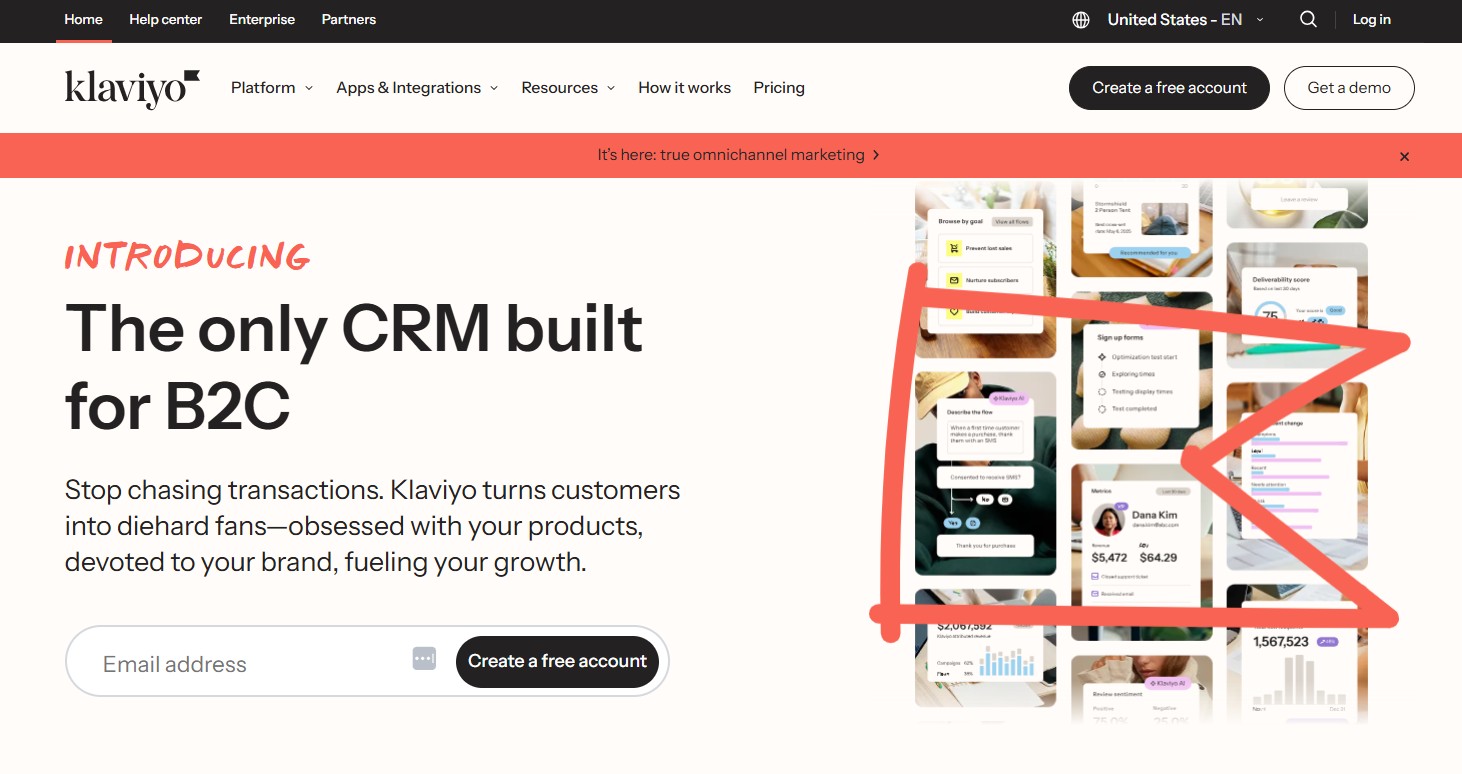
Mailchimp versus Klaviyo
Klaviyo is a feature-rich marketing automation platform designed for eCommerce businesses. With its email marketing, SMS marketing, and mobile push notifications, online store owners stay in touch with their customers across touch points.
This Mailchimp alternative lets you keep all customer data under one roof and build laser-focused customer profiles. Website activity, email and SMS engagement, ads, and reviews are some of the data sources you can access using Klaviyo’s Data Platform (although we should mention this is a standalone product with different pricing).
Where Klaviyo excels:
- AI-powered tools to deliver personalized product suggestions, analyze customer sentiment over time or by topic, and discover each customer’s preferred channel
- Option to combine email and text with in-app messages for effective omnichannel engagement
- An impressive list of 350+ integrations so you can effortlessly connect Klaviyo with your favorite tools, including loyalty apps or survey and quizzes builders
- Klaviyo’s Flows AI generates automated workflows for you based on the description you provide
- Built-in reporting dashboards that offer brands a unified view of their performance across channels while predictive analytics help them optimize campaigns
- Unlimited push notifications included in all plans
Where Klaviyo could improve:
- Clunky interface and hard-to-grasp features that take some time to get used to according to user reviews
Pricing:
Klaviyo has a free plan for up to 250 active contacts and 500 email sends/month. However, you won’t be able to use advanced features like multi-channel segmentation. The same limitations apply in the low tier, starting at $45/month only for email. If you want to pair it with SMS marketing, the price goes up to $60/month.
3. Brevo
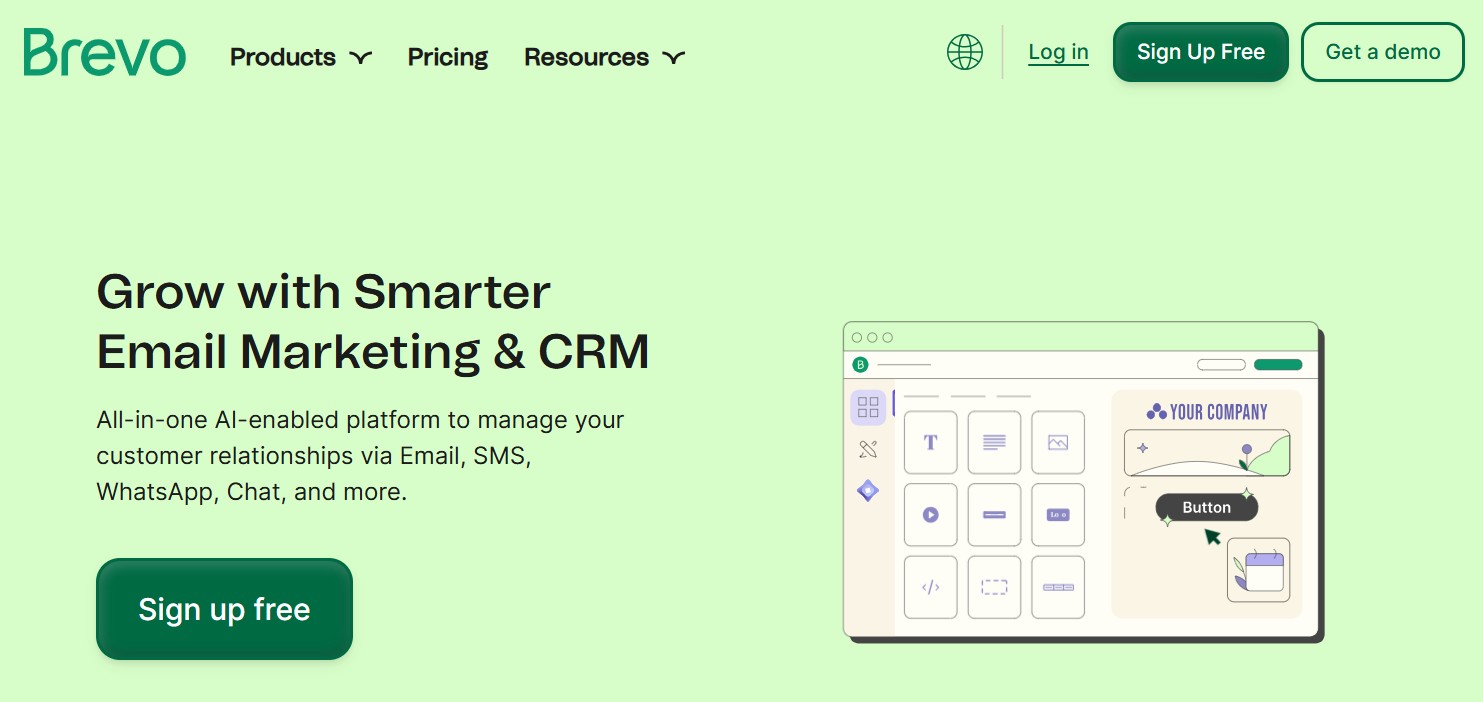
Mailchimp versus Brevo
The next email solution on our list is Brevo. Besides email, you can use the platform to reach your audience with SMS and WhatsApp campaigns. You also get push notifications and CRM capabilities to manage and personalize your sales pipeline.
Brevo comes with user-friendly tools like its drag-and-drop email builder and automation features to segment your audience effectively and send targeted, timely messages. These characteristics are mostly why small businesses and eCommerce companies choose this Mailchimp alternative, combined with its cost-effectiveness.
Where Brevo excels:
- Intuitive automation editor that lets you build cross-channel campaigns and use if/else conditions
- Premade automation workflows, ranging from welcome series and transactional emails to product announcements and recommendations
- Real-time email analytics, including heat maps and in-depth deliverability and revenue reports
- Generous free plan that includes core features, such as SMS marketing, dynamic content creation, and transactional emails
- Pricing model that charges based on the number of emails sent (regardless of list size), giving you better control over your budget
- 24/7 customer support offered on all plans in six languages via email, live chat, and social media—plus phone support for Enterprise and Business users
Where Brevo could improve:
- Landing page creation available only on high-tier plans (Business and Enterprise)
Pricing:
Brevo’s free plan allows you to have 2,000 subscribers and send 300 emails/day. Its cheapest plan costs $9/month with most of its features, including transactional emails. The most important limitation being basic reporting and no access to the landing page builder, WhatsApp campaigns (add-on), and push notifications.
4. Omnisend
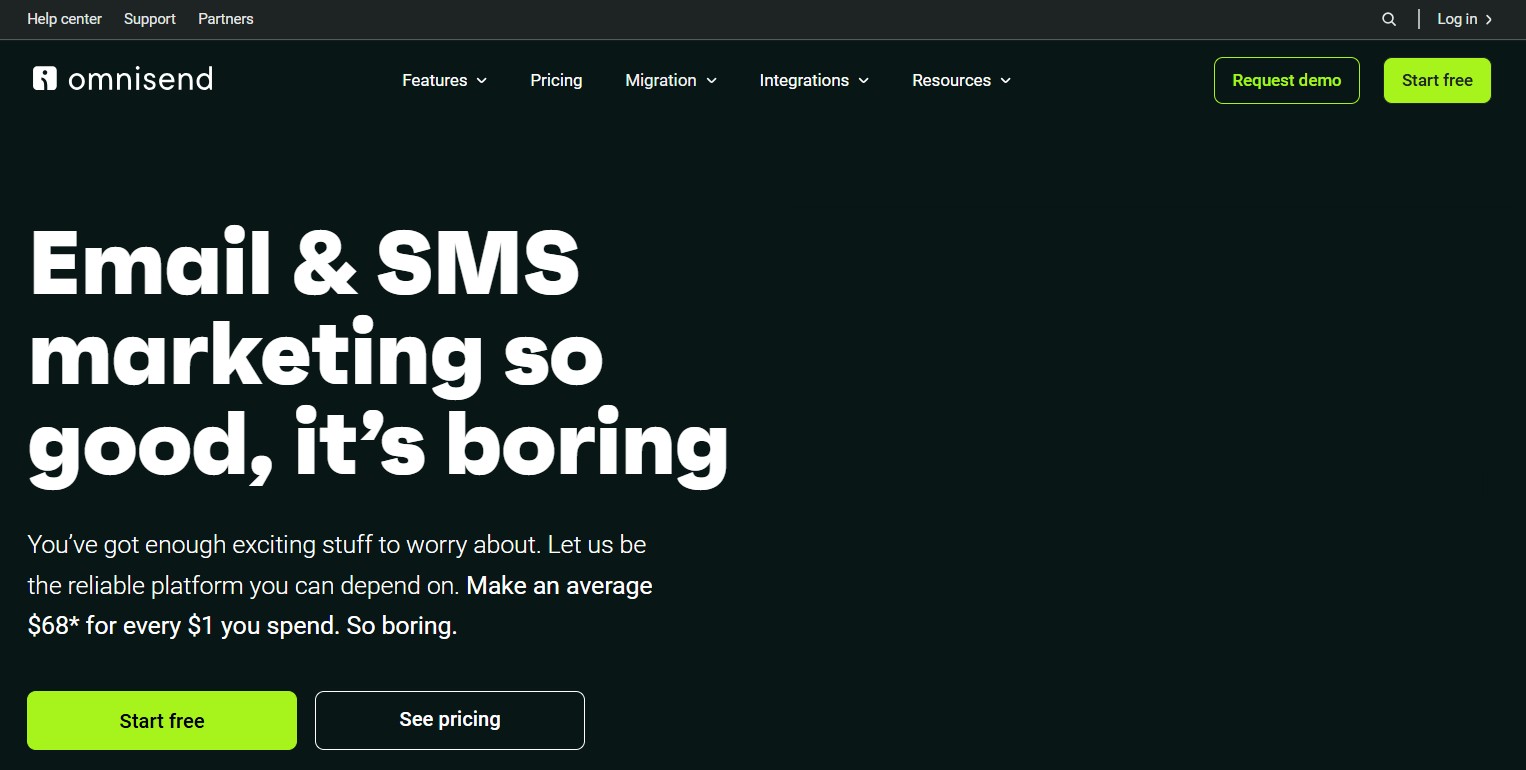
Mailchimp versus Omnisend
Omnisend is another platform focused on providing online stores with sophisticated marketing solutions. This solid Mailchimp alternative supports several channels, including email, SMS, as well as Google and Facebook retargeting.
Omnisend’s powerful automation helps you broaden your reach by adding different touch points in a single workflow. All made easy through the drag-and-drop workflow editor. With it, you can adjust any of the pre-build workflows offered by the platform.
Where Omnisend excels:
- Drag-and-drop email builder equipped with a Product Listing feature—just connect your online store and add products to your email directly from the editor
- 250+ email templates that cover many occasions and industries
- A library full of ready-to-use workflows for eCommerce-specific use cases, such as product and cart abandonment, order and shipping confirmation, and cross-selling
- Live chat and email customer support available 24/7 for all users (including the ones on the free plan)
- AI-powered segmentation that builds segments based on your prompts and identifies groups like at-risk or high-value customers
- Google Customer Match feature using smart segmentation to display your ads to specific audience groups as long as they fit the corresponding criteria
Where Omnisend could improve:
- Time-consuming feature discovery and implementation according reviews
Pricing:
Omnisend offers a free version ideal for starting eCommerce brands. They can send up to 500 emails and web push notifications. However, they only get $1 to try SMS marketing and limited reporting options. Paid plans start at $59/month with unlimited emails but no personalized product recommendations.
5. The Marketer
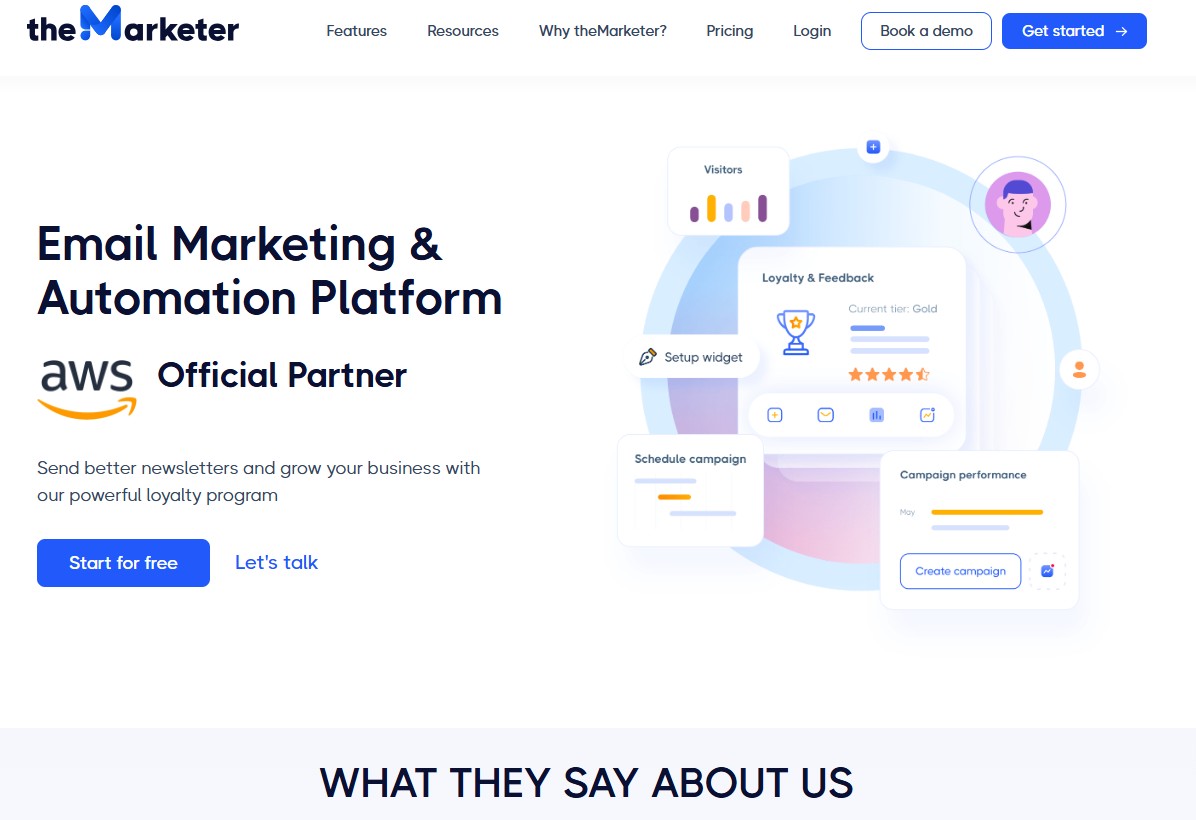
Mailchimp versus The Marketer
theMarketer is an all-in-one, omnichannel marketing automation platform built to help eCommerce and DTC brands scale efficiently, without relying heavily on paid ads. It combines email, SMS, and push notifications with loyalty, referral, and feedback tools—all integrated into a visually intuitive builder.
Where theMarketer Excels:
- True omnichannel marketing: Reach customers via email, SMS, and push notifications from a unified platform.
- Built-in loyalty and referral programs: Drive retention and word-of-mouth growth without needing third-party add-ons.
- No-code automation builder: Drag-and-drop workflows with pre-built journeys (welcome emails, cart abandonment, birthdays, upsell triggers) make setup fast and accessible.
- Advanced personalization & shoppable emails: Supports dynamic content, product blocks, and AI-powered recommendations that personalize campaigns at scale.
- Comprehensive forms & pop-ups: Capture leads with embedded or pop-up forms, then feed them into automations immediately.
- Strong delivery and reporting tools: Real-time analytics, A/B testing, optimal send-time delivery, and GDPR-compliant features included.
- Free tier available: Start free for up to 1,000 contacts with generous email allowances.
Where theMarketer Could Improve:
- Lacks advanced CRM or sales pipeline features
- Limited third-party integrations compared to more mature platforms
- No built-in AI assistant for automation strategy or predictive targeting (yet)
Pricing Snapshot:
- Offers a free plan for up to 1,000 contacts and limited email sends
- Paid tiers (starting around €20–27/month) unlock: SMS, push, loyalty, referral programs, and advanced marketing automation features
Making the Ideal Choice for Your Online Store
Mailchimp is a robust email solution for retailers. However, some of its popular alternatives offer the same features at more affordable prices—some of them even free. But making the switch from Mailchimp to one of the tools on our list shouldn’t be a light decision.
So, let’s sum up each tool’s strong selling points. Moosend offers advanced automation, real-time reporting, and AI-product recommendations on all plans. Klaviyo and Brevo add SMS marketing to the mix but not at the expense of your budget.
Omnisend is a good fit if you want to effortlessly import products from your store and into your email campaign.
Choosing wisely will save you valuable resources and put you on the right track for achieving business growth. So, research your options, pick one or two tools that align with your needs, and test them through their free version or trial. This is the only way to discover their unique strengths and stick with the email software that helps you thrive.
Author

Maria Fintanidou
Maria Fintanidou works as a copywriter for email marketing automation software Moosend, having created the Help Articles (FAQs) and overseen the platform’s translations in Greek and Spanish. She loves exploring new cultures and ways of thinking through traveling, reading, and language learning.

